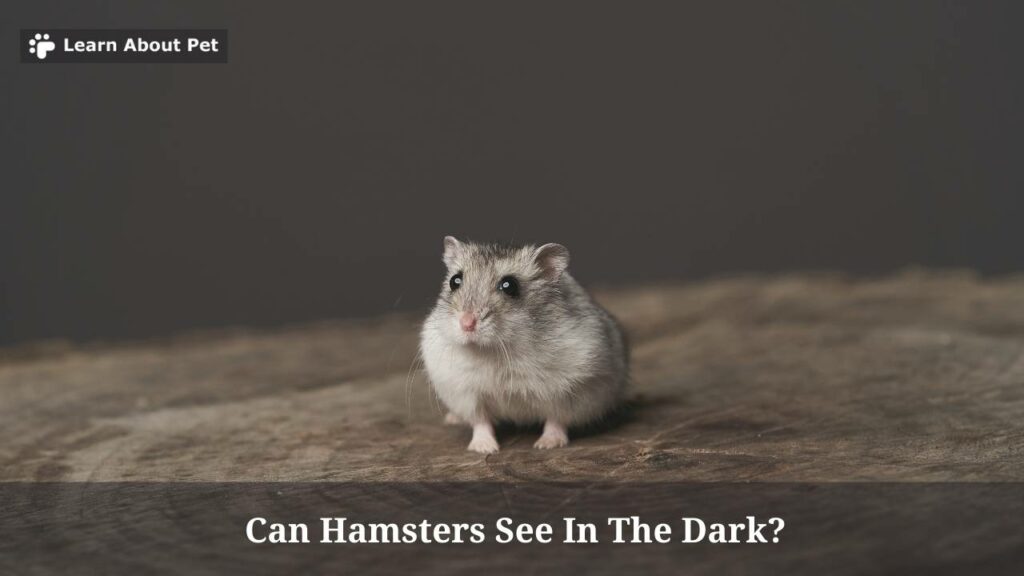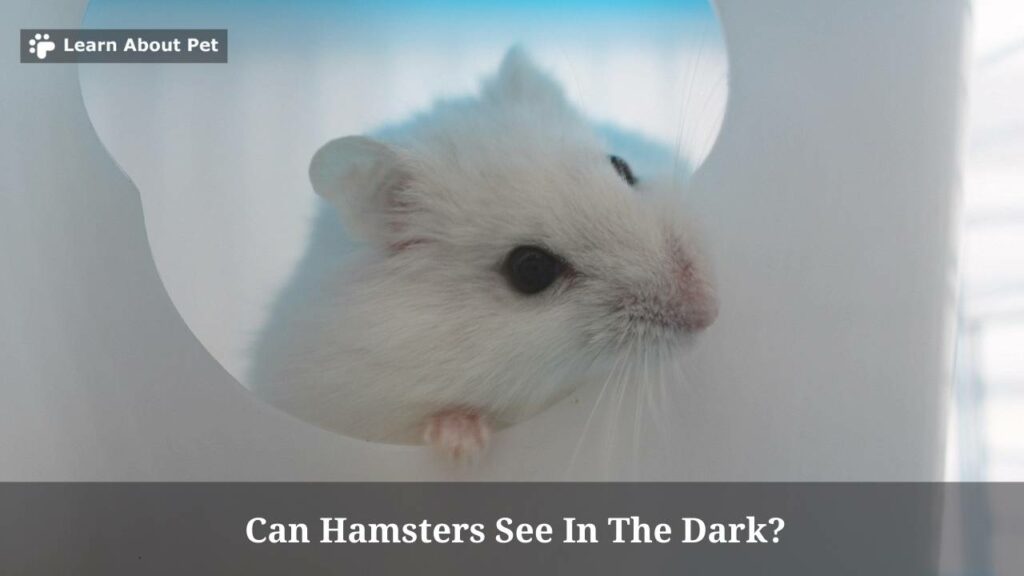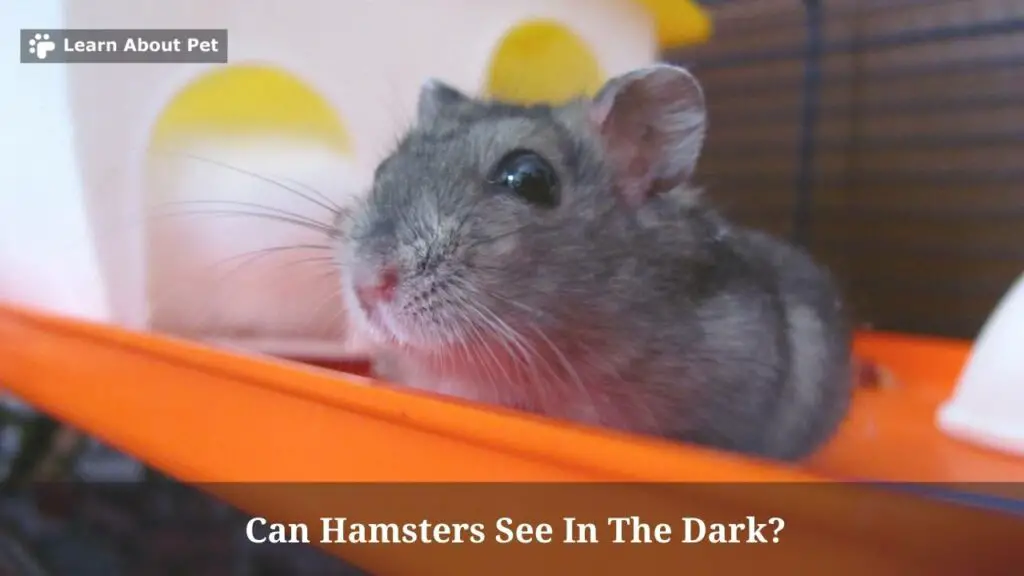One question that people who keep hamsters as pets ask often is as to whether the hamsters can see in the dark. There are also those who pose that question out of pure curiosity – even if they don’t actually keep hamsters. This article has the answer.
Can hamsters see in the dark? Hamsters can’t see in pitch dark conditions. But they can see in dim light conditions. Even when they are unable to see in pitch dark conditions, they rely on their keen senses of hearing and smell to survive quite well.
Right from the outset, it is important to understand that in nature, hamsters spend lots of their time in their burrows. Inside those burrows, it is usually pitch dark.
As an adaptation for surviving well in the burrows, the hamsters have developed very keen senses of hearing and smell.

Further, it is important to appreciate that hamsters are nocturnal, or at least crepuscular, according to some. Indeed that very fact is usually the basis for someone asking, can a hamster see in the dark?
Some nocturnal and crepuscular animals that are said to see better in the dark. The hamster is also nocturnal, or at least crepuscular.
So this causes people to ask, do hamsters see better in the dark? Or can hamsters see good in the dark?
The true position, however, is that hamsters are unable to see in pitch dark conditions.
Conversely, hamsters are also unable to see well in very bright light. Such light actually hurts them. So the best light for them is dim.
But there are people who, from their interactions with hamsters, develop doubts on whether the hamsters see at all. So let’s start there.
Can Hamsters See?
This question, on whether hamsters are able to see at all, usually comes from people who interact with hamsters regularly.
Such people come to realize that it is as if the hamsters are not sighted at all. That then is what leads to the question on whether hamsters can see at all.
The true position is that hamsters have some ability to see. They are born blind. But soon they get to start seeing.
Their vision may not be very good. But they are able to make sense of shapes. They can also make sense of major movements.
So hamsters have some sight/vision. It is just not what one would term as ‘good vision’ by any standards.
Can Hamsters See In The Dark?
If it is pitch dark, then the hamsters won’t be able to see at all.
However, if it is dark, but with some dim light available, then the hamsters will be able to see.
And ironically, if it were well-lit, the hamsters would have problems seeing!
Thus if you were wondering, can hamsters see well in the dark, now you know the true position. If it is pitch dark, they won’t be able to see at all. However, if it is dark but with some dim light coming in, then they can see.
The relationship between hamsters and light is complex. If it is pitch dark, they are unable to see. And if it is very well-lit, they are also unable to see well.
This state of affairs leads to other interesting questions like, is it OK for hamsters to be in the dark? Or should I cover my hamsters cage at night?
On whether it is OK for hamsters to be in the dark, there are different views. Some experts opine that being in the dark (at night) is ideal, to protect their circadian rhythms.
But others say that having some light on is good, to mimic moonlight. Moonlight is what they are exposed to at night when they come out of their burrows in the wild.
In the domestic setting, the hamsters can always go back to its burrow (hideout) in the cage, if it is uncomfortable with light. So if it wants to be in near pitch dark conditions, it just goes inside the hideaway.
The bottom-line is that hamsters’ vision is best under dim lighting conditions. They don’t see if it is pitch dark. And if it is well-lit, they also don’t see properly.
How Well Can Hamsters See In The Dark?
This depends on the degree of darkness.
In case it is pitch dark, then the hamsters won’t be able to see at all. But they can still move about, relying on their extra keen senses of hearing and smell.
In case it is dark, but with some dim light coming in, the hamsters will be able to see somewhat. They still don’t see very well. But at least they can make sense of shapes, as well as the major movements.
One may then ask, how can hamsters live in the dark burrows that are their natural habitats? And the answer, as hinted above, is in that they rely on their keen senses of smell and hearing to move about.

Do Hamsters Recognize Their Owner In The Night?
Whether or not hamsters are able to recognize their owners at all is a matter of conjecture.
Suppose one belongs to the school which holds that hamsters are able to recognize their owners. Then, are they able to recognize the owners at night?
If it is pitch dark, the hamsters won’t be able to see at all. Therefore they won’t be able to recognize their owners by sight. But if they have the ability to recognize their owners by scent, then that would be different.
If it is dark, but with some dim light coming in, the hamsters may be able to see somewhat. Even then, they only seem to be able to make out major shapes and major movements.
Whether they have the visual acuity to recognize and differentiate their owners from others is doubtful.
Even supposing they are able to visually recognize their owners, the owners would need to come close – within inches – for the hamsters to recognize them that way.
Can Syrian Hamsters See In The Dark?
Like all others, Syrian hamsters are nocturnal or crepuscular. They ‘operate’ at night or dawn and dusk. But if it is pitch dark at night, it is impossible for them to see.
Nonetheless, they have good senses of smell and hearing, which they rely on in their operations.
Syrian hamsters may, however, see (somewhat) in the dark, if there is some dim light coming in.
In the wild, they rely on moon light, which is by definition dim. Even as pets, they are only able to see a bit with dim lighting.
Can Robo Hamsters See In The Dark?
If it is completely dark (with zero lighting), the Robo hamsters won’t be able to see at all.
But in case they are exposed to some level of dim light (even on a dark night), then they are able to see.
We said as much, while answering the question on can hamsters see in the dark generally?
Therefore much depends on how ‘dark’ it is. If it is completely dark, they don’t see. But if it is dark, yet there is some level of dim light around, the Robo hamsters will see somewhat.
Nonetheless, even when they see a bit with dim light, their vision won’t be very good. It is just to make sense of the major shapes and the major movements around them.
Can Teddy Bear Hamsters See In The Dark?
People who keep Teddy Bear hamsters as pets may keep on hearing them making movements at night, in the dark.
This is what leads to the question on whether the Teddy Bear hamsters are able to see in the dark.
The true position is that the Teddy Bear hamsters are able to continue moving about in dark conditions, without necessarily seeing. For that, they rely on their excellent hearing and smell senses.
So if it is pitch dark, the Teddy Bear hamsters won’t be able to see. But that won’t bar them from making the movements they need to make.
Should it be dark but with some dim light around, the Teddy Bear hamsters are able to see better. In fact, dim light is the best type of light for them.
If light becomes too bright, it turns out to be harmful to the Teddy Bear hamsters.
So, to reiterate, Teddy Bear hamsters can’t see if it is pitch dark. But they can see a bit if it is dark yet there is exposure to some dim light.
Can Dwarf Hamsters See In The Dark?
The light under which Dwarf Hamsters see best is dim light. Thus if it happens to be completely dark (with zero lighting) Dwarf Hamsters won’t be able to see at all.
Even with bright light, vision for Dwarf Hamsters is troublesome. Dim light is what works best for them.
Pitch dark? The Dwarf Hamsters don’t see at all. (But they are still able to continue operating, relying on their smell and hearing senses).
Dark but with some dim light? The Dwarf Hamsters are able to see somewhat.
Brightly-lit? Seeing becomes troublesome for the Dwarf Hamsters.
By the way, this applies to all types of Dwarf Hamsters. Even if you were to be more specific and ask, can Russian Dwarf Hamsters see in the dark, the answer would still be along the same lines.
So would be the answer to the question on, can Robo Dwarf Hamsters see in the dark?
Even if you go further and research on “can Chinese dwarf hamsters see in the dark”, you will see that what we have described is still the applicable position.
So if it is pitch dark, they don’t see. However if, in spite of it being generally dark, there is some dim light available to them, they are able to see somewhat.
Can Winter White Hamsters See In The Dark?
A good number of people who keep hamsters as pets have those of the Winter White variety. So, are these Winter White Hamsters able to see in the dark?
The eyes of the Winter White Hamsters – just like all other Hamsters – require some dim light to see.
Therefore if there is absolutely no light (if it is pitch dark), they don’t see at all.
However, if conditions are such that some dim light is coming in, then the Winter White Hamsters may be able to see a bit.
So the fact that they are ‘nocturnal’ doesn’t mean that they see even when it is pitch dark. It is just that even when visibility is zero for them, they are able to rely on their other senses (smell and hearing) to continue with their activities.
Do Hamsters Need Light At Night?
So far, we have established that Hamsters are unable to see if it is pitch dark. It has become clear that for them, some dim light is most ideal for vision.
This leads to other questions like, are hamsters OK in the dark? Or should I leave a light on for hamster?
So, indeed, do hamsters need light at night? Some experts say that it is best to leave the hamsters with some sort of night-light. This can mimic moonlight, which is what they are exposed to in nature when they come out of their burrows at night.
There are, however, other experts who are of the view that having a light on for the hamsters at night is unhealthy.
Ultimately, you have to choose which school of thought to subscribe to. But in case you opt to leave them with a light, you need to ensure that the light you use is rather dim.
A bright light can be quite harmful to hamsters. It can irritate their eyes, and even possibly cause them problems like depression.
So you only get to choose between leaving them with no light at all and leaving them with a rather dim light.
Final Verdict – Can Hamsters See In The Dark
Hamster’s eyes require some little light to see. Therefore under pitch dark (zero visibility) conditions, hamsters are completely unable to see.
However, if hamsters are in a dark place where there is nonetheless some dim light coming in, then they should be able to see. Dim light is, for hamsters, the best form of light.
In case the lighting becomes bright, the hamster’s vision becomes poor again. Bright light causes harm to their eyes. Thus the only lighting condition under which hamsters can see somewhat well is dim light.

Even then, their vision usually only allows them to make out the major shapes and major movements around. It is not very good vision, under any situation.
The truly better senses in hamsters are those of hearing and smell. Through these, the hamsters are able to thrive, in spite of having quite poor vision.
Opinion on whether to leave hamsters with some light at night or not is divided. But in case one opts to leave them with some form of light, then it just has to be rather dim light: never should it be bright light.
As a pet lover, make sure to learn about pet more and give your pet hamster a good and comfortable life!

Welcome to Learn About Pet. My name is Rajkumar Ravichandran and I love all pets, travel, and amazing food. I write about my passion and personal experience caring for multiple pets in this blog! ❤️
Post Disclaimer
DISCLAIMER: THIS BLOG OR WEBSITE, "Learn About Pet", DOES NOT PROVIDE YOU WITH MEDICAL ADVICE AND IS NOT A SUBSTITUTE FOR MEDICAL ADVICE. ALWAYS GET IN TOUCH WITH YOUR PERSONAL VETERINARIAN AND USE INFORMATION HERE AS GENERAL ADVICE.
The information, including but not limited to, text, graphics, images and other material contained on this website are for informational purposes only. No material on this site is intended to be a substitute for professional veterinary advice, food recommendation, diagnosis, or treatment. Always seek the advice of your veterinarian or other qualified health care provider with any questions you may have regarding a medical condition or for pet food related questions.







